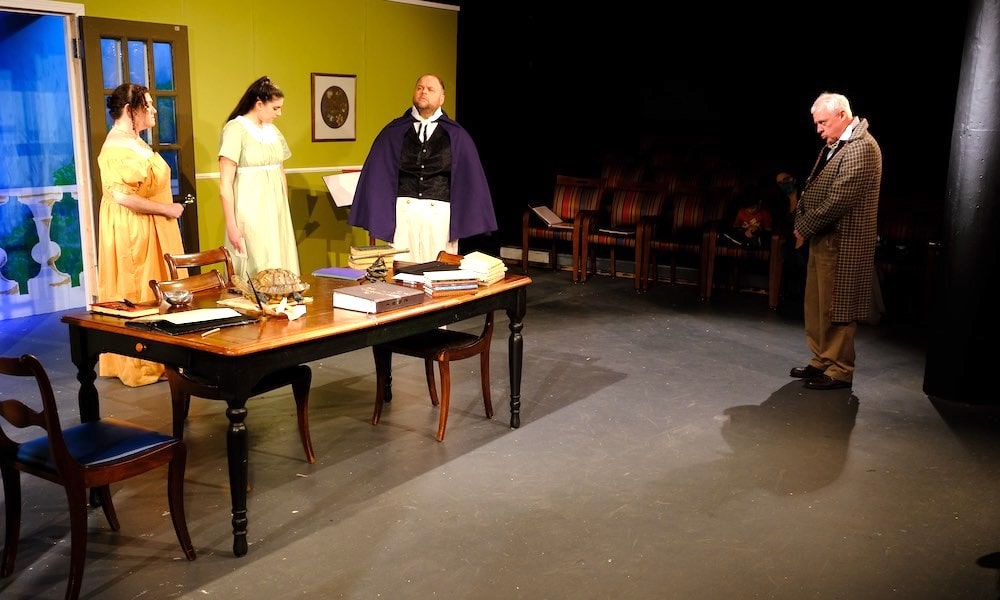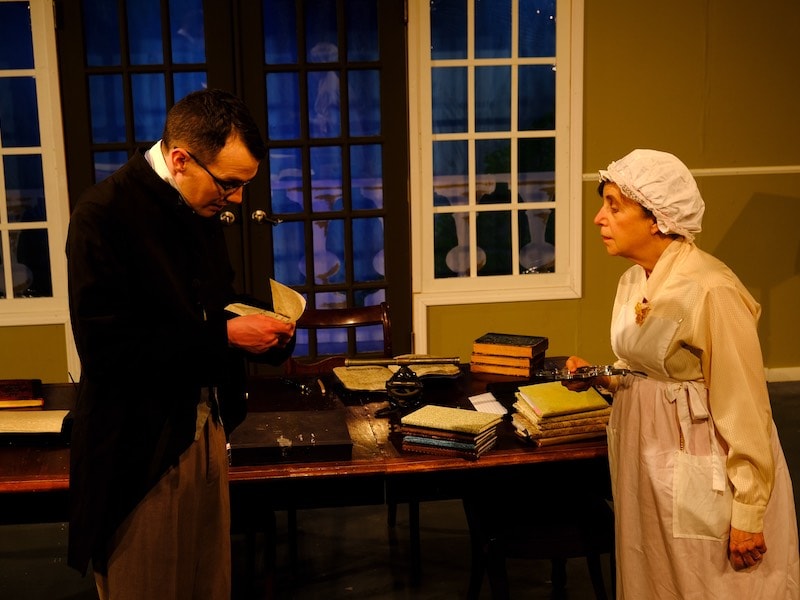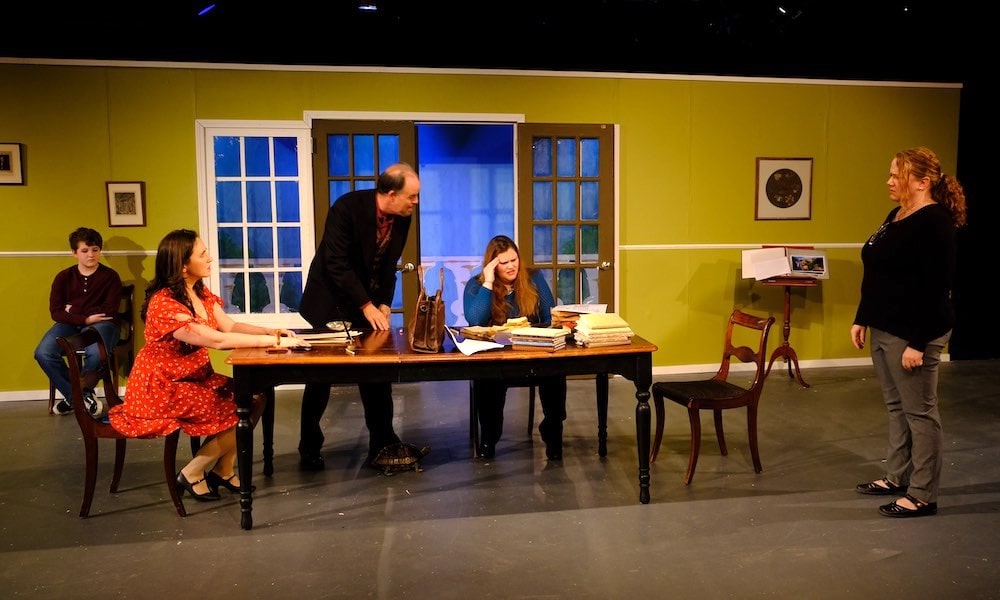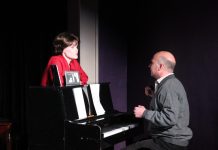By rights, Tom Stoppard’s Arcadia should be chaos.
Equal parts country-house farce, time-travel experiment, and learned treatise, it takes subjects as disparate as landscape gardening, academic backstabbing, botany, grouse hunting, sexism, thermodynamics, Fermat’s Last Theorem, and fractals, and simmers them together with liberal amounts of sex for two-plus hours. The result could be a muddled mess, a sorry stew of unrelated ideas, but in Stoppard’s hands, it becomes a delicious feast for the intellect.
And since Arcadia’s inspiration and ultimate subject is chaos theory and the wondrous appearance of order out of disorder, that is entirely appropriate.
Arcadia takes place in a single large room overlooking the grounds at Sidley Park, an aristocratic English stately home, in two different eras simultaneously — the early 19th century and the present day. In 1809, 13-year-old genius Thomasina (loosely inspired by Ada Lovelace, the mathematician and daughter of Lord Byron credited with inventing computer programming) is confounding her tutor Septimus, who is also carrying on affairs with various women in the house and trying to avoid fighting a duel with an irate husband. In modern times, a writer, Hannah, researching a mysterious hermit who lived on the grounds, is confronted by an arrogant academic, Bernard, who is determined to prove that Lord Byron killed a man in a duel while a guest at the house, and had to flee England as a result.
Scenes alternate from past to present, and objects from both eras pile up on the center table, with earlier characters penning letters, drawings, or treatises that are picked up and pondered by the later ones. The emerging facts of what actually happened contrast amusingly with later assumptions about them. The question of how much we can ever really know hovers over the show.

The dialogue is sharp, witty, and rich, in ways appropriate to each era. Innuendo, insults, and casual profanity alternate with passionate arguments about science vs. literature, classicism vs. romanticism, thought vs. feeling, past vs. present, facts vs. theories, the gain and loss of knowledge, the nature of determinism, and where sex fits into it all.
In the final scene, characters from both eras occupy the stage at once, with the modern ones dressed in Regency garb for a fancy dress ball. The parallels and repetitions of past and present mix together, and themes and patterns emerge out of the seeming chaos.
It takes smart, talented actors to make all this intelligible, and the Greenbelt Art Center’s cast here is up to the challenge.

Among the 19th-century characters, Julia Frank as Jellaby the housekeeper makes the most of being essentially a plot device for delivering letters and gossip, but adds more behind the scenes as dramaturg, writing an illuminating program note.
Dave Buckingham (Captain Brice) and Bill Kelleher (Richard Noakes) bluster and cower appropriately before Lady Croom (Kate Wanschura), the indomitable lady of the house. Wanschura delivers her complicated and witty lines with brio, but one might wish her accent were a little more British. Aref Dajani, as the cuckolded poetaster Ezra Chater, ricochets hilariously back and forth between anger and ego faster than a misfired musket ball.
Daniel Dausman, as the tutor, Septimus, is eloquent and unflappable from the moment his pupil opens the play by asking, “Septimus, what is ‘carnal embrace’?” (answer: sex). There is some question in the beginning as to his emotional range, but when he angrily agrees to a duel, and then later dances tenderly with Thomasina, it becomes clear his earlier reserve is a conscious character choice.
Ani Arzoumanian is excellent — smart, poised, and luminous — as Thomasina. She seems almost too old as the 13- to 16-year-old, but since she is, in fact, actually a high school student, her precociousness is entirely appropriate for the character.
Claire Fontaine handles well the time-spanning dual role of Gus/Agustus Coverly, being by turns sweet and skittish as the mute modern Gus and imperious as the young Lord Augustus — impressive for a 14-year-old relative newcomer.

As for the modern characters: Ashley Greeley’s Chloe Coverley simpers and simmers entertainingly as the latest in a long line of sexually enthusiastic women of Sidley Park.
Laura Fisher, as Valentine Coverley, adds extra layers of time-bending nuance to her character having played Thomasina in the first GAC production of Arcadia 26 years ago. It also brings a lovely modern update to all the different variations of love the show presents that an originally male character is now female.
The standouts in the cast, if such there can be in this strong ensemble, are the two writers, Hannah Jarvis (Lauren Winther-Hansen) and Bernard Nightingale (Brian Binney). Both are seasoned actors, and it shows in their repartee and range. Winther-Hansen is excellent as a brilliant woman who has been through it all and no longer gives a flying folio what the male academic establishment thinks of her. Binney is particularly fine as the pompous, condescending, mansplaining Bernard, and watching him get his cringing comeuppance is delightful.
The director, Randy Barth, capably corrals all this chaos into a coherent story. The arrangement of the characters on the three-quarter stage with a table in the middle could have been handled with more care for the sightlines, however. The room is supposed to be neoclassical, and perhaps symmetry was paramount, but angling the table would have made it easier to see characters from the side seats — often Septimus in particular had his back squarely to the audience stage right.
The only disappointment about the show comes in the technical aspects. The set (designed by Dan Lavanga) and costumes (by Megan Scott) are unfortunately uninspiring. The women’s Regency dresses are nondescript, and on opening night Lady Croom’s seemed almost to be coming apart at the seams. Some of Lynne Slater’s props, such as Thomasina’s workbooks, are good, but the book that is supposed to represent the landscape architect’s drawings of the changes to the park is a jarringly anachronistic collection of plastic laminated printouts of old paintings. Kudos to Brittany Klein, however, for her interesting and evocative show logo blending botanical leaf drawings into computer vectors.
Overall, Greenbelt Arts Center’s Arcadia is a worthy production of one of the greatest plays of the last half-century — a fine presentation of a feast for the mind.
Give your brain a treat. See Arcadia.
Running Time: Approximately two and a half hours with one 15-minute intermission.
Arcadia plays through March 18, 2023, at Greenbelt Arts Center, 123 Centerway, Greenbelt, MD. For tickets ($24, general admission; $22, senior/military; $12, child/student), phone the Box Office at 301-441-8770, go online, or buy at the door.
Fridays and Saturdays at 8 PM, Sundays at 2 PM. The final performance on Saturday, March 18 will be a 2 PM matinee.
The program for Arcadia is online here.
COVID Safety: You will be required to wear paper or cloth masks in all areas of the facility, at all times. You must wear a mask even if you have been vaccinated against COVID-19. Click here to read the venue’s current COVID-19 Policy.




